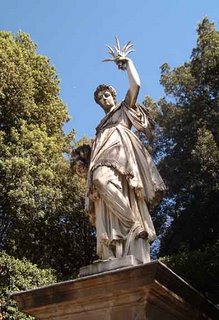The Gardens

Whatever rises out of the dust eventually attracts insects. I take my lunch in the gardens, out in the sun where the song of insects can be heard and the wind in the trees and through the bowing flowers is a pleasure and a respite. The breeze touches with hidden fingers the surface of the pools in the fountains, they shimmer and ripple over the reflected face of the sky. The sun makes a heavenward path through chutes of clouds. The sound of water spilling its basin so casually, refilling and spilling, spilling and making the light dance, as I lean myself back into the lap of an old wooden bench on the highest terrace of the crisscrossed footpaths that wind the hill and sever the green field. It is absurd, the extremes of sensory experience offered by the Great Hall of Records. One can go from the darkest, most bewildering corridors to the most color-saturated landscapes within a matter of fifty steps. The giant offers, with open hands, the full spectrum of available light. Open hands? From my bench on the hillside the Great Hall looks only like a face with a great glass chin. What was going through the mind of this madman, the architect, when he conceived this monumental project? Was he employed by some maniacal Count of the Clouds?
There are statues. And one in particular draws me. It is tucked away near one of the walls, for these gardens are walled in from the city. You wander on past the babbling of the last fountain, around a low willow grove, and there is a small, I guess one would say, empty plaza, all of stone, a little circle with a Roman-style sculpture on a short pedestal. The trees here are placed in a semi-circle about the figure, and block all but a slight warm breeze that touches with a careful palm. Often, at noon, as improbable as that is, the moon, a tiny daytime moon, sits directly to the right of the head, in the sky, opposite the arch of the torch-bearing arm. And in the other arm, close to the body, a bouquet of flowers. The robes hang graciously about the body, and I never decided if it was a man or a woman. But it stares down at me, bearing a guiding light, much stronger than the light of the moon, the lonely man in the moon. But what is most lovely is how it shows its age. It is worn, streaked by rain, darkened by filth that rolls in from the city on the wind. To me, the youth of its body, the flow of its robes, the arm stubbornly jutting out its fire at the moon day and night, despite the obvious diminution brought on by time, makes this somewhat of a holy place.
But I am granted only an hour. Even more absurd because I obey this ghost command despite the fact my superiors do not even frequent the Great Hall. It has been weeks since I have had to account for myself in any way or have spoken to anyone here, but for the formal necessities. I feel as though I could disappear completely and it would be months before anyone noticed. I take my time and wander back past my bench, retrieving the book I never even opened during lunch. What would I want to read about, when I have a sunny day, a bench on which to rest my weariness, a field on a hill growing with manic colorful life, all vibrating silently in the breeze, all for me to comprehend? And there, on the other side of the Great Hall, the city stretching out like a vast petrified forest.

<< Home